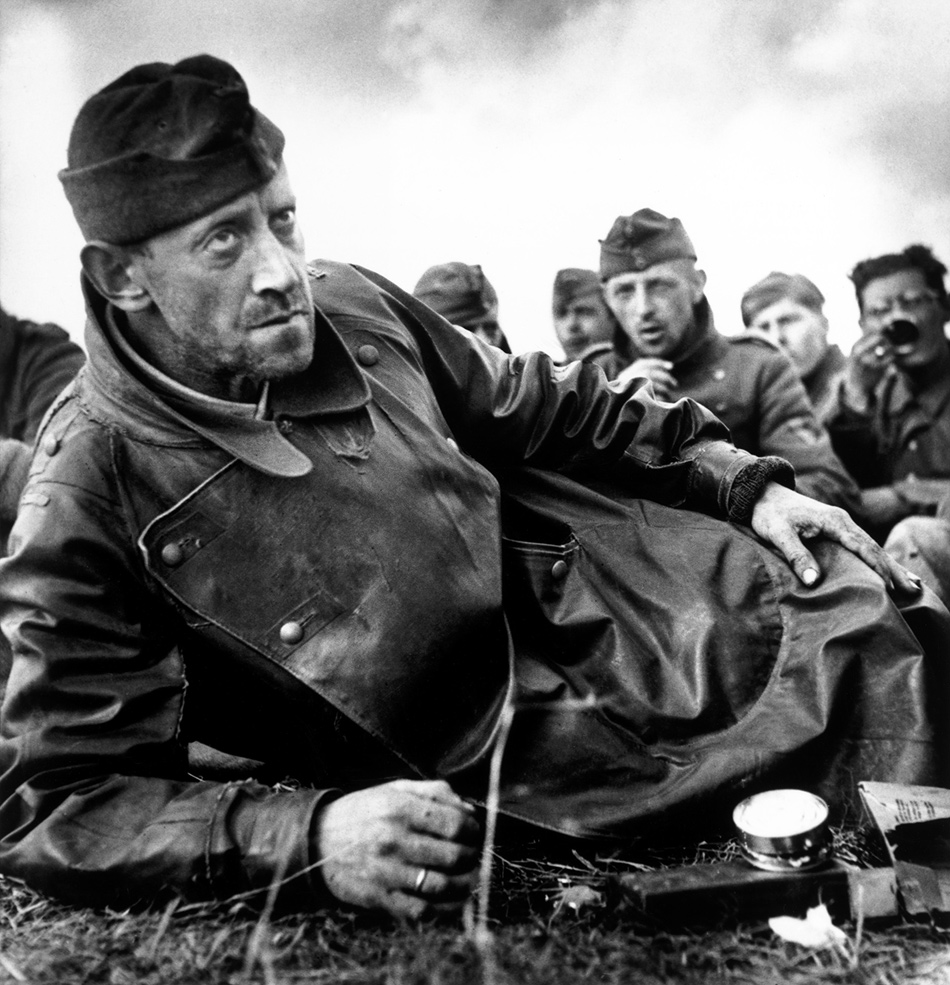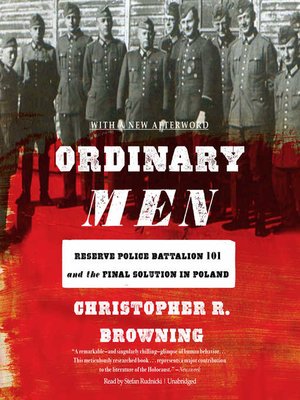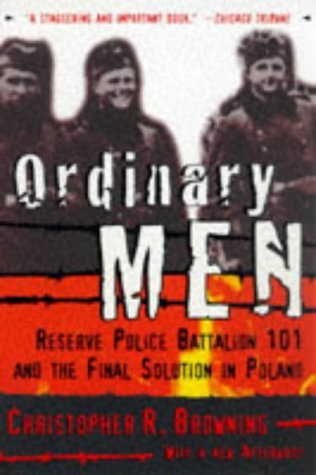Ordinary Men: Reserve Police Battalion 101 and the Final Solution in Poland is a book by Christopher Browning that examines the actions of a unit of German reserve police officers during the Holocaust. The unit, known as Reserve Police Battalion 101, was responsible for the mass murder of Jews in Poland during World War II. Browning's book is a harrowing account of the ways in which ordinary men can be complicit in horrific acts of violence and how the power of authority can lead to moral corruption.
The book is based on extensive research and interviews with surviving members of the unit, as well as documents and records from the time period. Browning's central argument is that the members of Reserve Police Battalion 101 were not inherently evil or sadistic individuals, but rather ordinary men who were placed in extraordinary circumstances. Through a combination of peer pressure, propaganda, and a desire to conform to societal norms, these men were able to justify and carry out acts of extreme violence against innocent civilians.
One of the most striking aspects of Browning's book is the way in which it challenges the notion of the "banality of evil," popularized by philosopher Hannah Arendt in her coverage of the trial of Adolf Eichmann. Arendt argued that Eichmann, a high-ranking Nazi official, was not a monstrous person but rather a bureaucrat who carried out orders without thinking about the moral implications. Browning's book shows that the men of Reserve Police Battalion 101 were not just blindly following orders, but were actively participating in and supporting the extermination of Jews.
Another important theme in the book is the role of authority and power dynamics in shaping the behavior of the men in the unit. The officers in charge of Reserve Police Battalion 101 were able to wield a great deal of control over their subordinates, using rewards and punishments to motivate them to carry out their duties. The men also faced pressure from their peers to conform to the group's expectations and to not question the orders they were given.
Ultimately, Browning's book serves as a powerful reminder of the dangers of unchecked authority and the importance of standing up for one's values in the face of evil. It is a sobering account of how ordinary men can become complicit in acts of horrific violence, and serves as a cautionary tale for future generations.
Ordinary Men by Christopher R. Browning

Violence was prohibited, but within six days, the guards began sadistically dehumanizing and humiliating the prisoners. A race war has no borders. After all, the testimonies were given in the 1960s, more than 20 years after the events in questions, so these men have faulty or repressed memories and some of them lie. Having explained what awaited his men, Trapp then made an extraordinary offer: if any of the older men among them did not feel up to the task that lay before him, he could step out. Within every community, the peer group exerts tremendous social pressures and sets the moral norms. The remaining Jews—the women, children, and elderly—were to be shot on the spot by the battalion. On July 13, 1942 the men of RPB 101 arrive in Józefów, Poland and gather around their commander, Major Wilhelm Trapp.
Ordinary Men: Reserve Police Battalion 101 and the Final Solution in Poland by Christopher R. Browning, Paperback

Browning delves deep into the psychological literature to find some explanations. An example might be if a soldier who has watched close friends die in combat then brutally kills several enemy soldiers on the side of the road later that day. Three reasons why most of the men decided to participate in the mass killings It has been a mystery on how these ordinary people turned into performing mass killings to the Jews, but Christopher has tried to unravel this mystery in his book through giving three major possible reasons. If the main issue was to get rid of the Jews, something else could be done to eliminate the whole generation from that land. Trapp had middling authority, but he would invoke authorities higher on the chain of command. Ultimately, there is no single answer to this question. In every society we are conditioned to defer thinking and morality to authority.
Ordinary Men Quotes

. There made use of the opportunities that were offered to them to proof their loyalty. Nevertheless, the author is able to persuade the readers to empathize with the members of the 101 battalion. While this book discusses a specific Reserve Unit during WWII, the general argument Browning makes is that most people succumb to the pressures of a group setting and commit actions they would never do of their own volition. In his quest for answers, Browning stumbled upon interrogation files for Reserve Police Battalion 101, a unit of the German Order Police.
FREE Ordinary Men PDF Book by Christopher R. Browning (1992) Read Online or Free Downlaod

All this changed in the forest outside Łomazy as Gnade sought to entertain himself while waiting for the Jews to finish digging the grave. Browning, however, developed an early interest in the question of whether small villages and towns were subject to the same violence as the large ghettos. One group was the order police while the other one was a secret police branch whose main operations were not, to be made known by everyone due to security purposes Cesarani 142. The book also has a detailed analysis of the members of the RPB 101. Chicago Tribune A remarkable—and singularly chilling—glimpse of human behavior. In order to make the district truly judenfrei, Globocnik realizes that these Jews must be killed.
Ordinary Men Chapter 18: Ordinary Men Summary & Analysis

Details of ordinary reserve police is explained on how they change from being average to becoming cold blooded killers Browning 188. Even if 10 million Jews were killed and others made disabled, even the killers were later affected greatly by those murderous inhuman actions. This meticulously researched book. Over the following months they participated in the direct shootings of at least 38,000 and placed a further 45,000 on trains to the concentration camps. One of the concerns Browning expressed in the Preface to Ordinary Men is that when researchers and historians focus on understanding the perpetrators of the Jewish genocide during World War II, that understanding might breed sympathy which might breed forgiveness. Another policeman witnessed him at the schoolhouse. The Batallian faced choices, most of them committing terrible deeds.
Ordinary Men Preface Summary & Analysis

Following Orders: The authoritarian political culture of the Nazi dictatorship was savagely intolerant of dissent. If some of these technologies were available during that time, all the Jews could be eliminated within a very short time for instance through the use of nuclear bombs. Before going on with this story, Browning details the history of the Order Police in Germany. No one in such a political climate should disobey them, they insisted. At the time, he attributes this to a bad dysentery vaccine he received in 1942, but later he says it was induced by the stress of the murders and violence that surrounded him. Many factors contributed to it, but none without some kind of qualification.
Ordinary Men

New York: Cambridge, 1999 , 45. The one surprising officer is Gnade, who is initially disgusted with violence and yet he becomes the most ruthless officer in the battalion. The time had come for Trapp to inform the men of their assignment. Their background status would not allow them to question the authority even on those serious matters of killing Browning 202. Most came from Hamburg, by reputation one of the least nazified cities in Germany, and the majority came from a social class that had been anti-Nazi in its political culture. Browning informs readers that the men in Battalion 101 were not necessarily hardcore Nazi adherents. The Order Police was also charged with transporting people to concentration camps.
Ordinary Men Chapter 1: One Morning in Józefów Summary & Analysis

This process goes on for months, well into Spring 1943, and there is no way to determine precisely how many Jews the men killed during this time. About 300,000 Jews were deported from Warsaw between July 22 and September 21, 1942. Most of the time, he used to incite the men under him to kill Jews through claiming that they all possessed some demonic acts. Reserve Police Battalion 101 is a good example of gray zone perpetrators: men who are initially horrified become willing perpetrators with time, including those like Buchmann who tried to avoid any involvement in violent actions but participated when authorities demanded it. This means that there had to be several German operatives on the ground during the height of the Holocaust.







